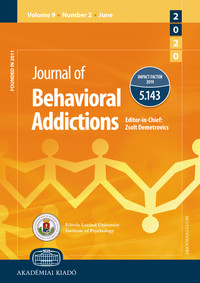Event-related potentials in a two-choice oddball task of impaired behavioral inhibitory control among males with tendencies towards cybersex addiction
Event-related potentials in a two-choice oddball task of impaired behavioral inhibitory control among males with tendencies towards cybersex addiction
Author(s): Jianfeng Wang, Bing DaiSubject(s): Behaviorism
Published by: Akadémiai Kiadó
Keywords: cybersex addiction; behavioral inhibitory control; event-related potentials; N2; P3
Summary/Abstract: Background and aims. Impaired behavioral inhibitory control (BIC) is known to play a crucial role in addictive behavior. However, research has been inconclusive as to whether this is also the case for cybersex addiction. This study aimed to investigate the time course of BIC in male individuals with tendencies towards cybersex addiction (TCA) using event-related potentials (ERPs) and to provide neurophysiological evidence of their deficient BIC. Methods. Thirty-six individuals with TCA and 36 healthy controls (HCs) were given a Two-Choice Oddball task that required them to respond differently to frequent standard stimuli (images of people) and infrequent deviant stimuli (pornographic images) within 1,000 ms. Electroencephalography (EEG) was recorded as the participants performed the task. Results. Despite the similarity of standard stimuli between the groups in terms of reaction times (RTs), the RTs of the TCA group to deviant stimuli were much slower than those of the HC group. The behavioral difference was accompanied by group differences in the averaged amplitudes of N2 (200–300 ms) and P3 (300–500 ms) components in the deviant-standard difference wave. More specifically, compared to the HC group, the TCA group demonstrated smaller N2 and P3 amplitude differences for deviant than standard stimuli. Discussion and conclusions. Individuals with TCA were more impulsive than HC participants and shared neuropsychological and ERP characteristics of substance use disorder or behavioral addictions, which supports the view that cybersex addiction can be conceptualized as a behavioral addiction.
Journal: Journal of Behavioral Addictions
- Issue Year: 9/2020
- Issue No: 3
- Page Range: 785-796
- Page Count: 12
- Language: English

